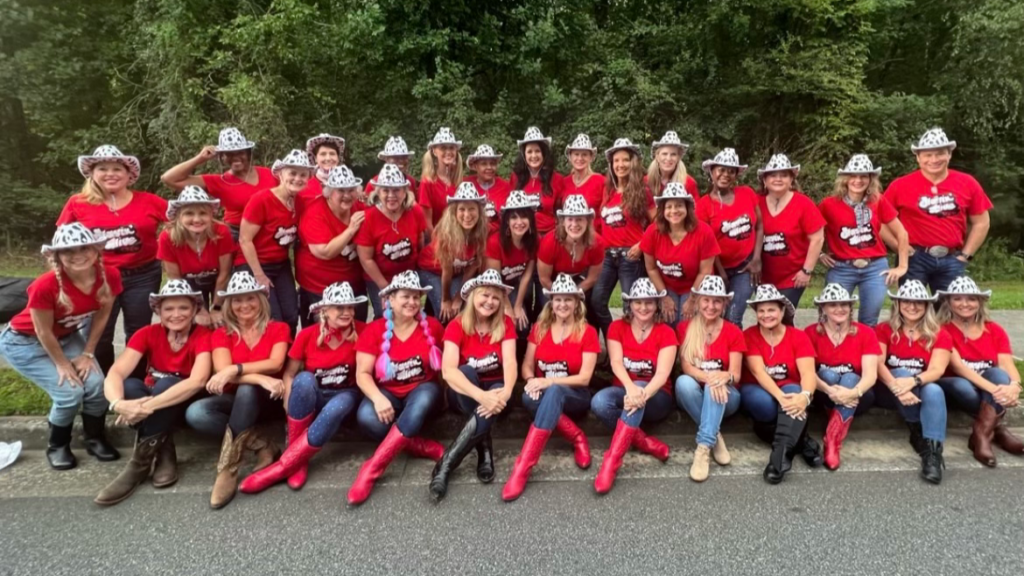Building a Healthy Support System – Lessons from the Sisterhood of Stayin’ Alive Crew

Whether you are trying to thrive professionally or personally, one thing is for certain – a healthy support system is essential. We do, think, and feel better when surrounded by like-minded souls – your birds of a feather – the people who truly care about you. It is reciprocal and it is real.
Technically defined as a social group where you share commonalities, a community can be a birth family or the family you create – such as people with common interests or practices – like a professional association, religious, educational, or civic group. The point is that you can create your community however you like. It might be specific groups for the short term or individuals who have your back throughout the course of your life.
A support system can constitute a gathering of people who are united in their enthusiasm for a topic, like women who work in technology, advocates of vegan cooking, or fly fishermen in the upper Midwest. Within this kind of construct, individuals come together to share their feelings, concerns, setbacks, and milestones, looking to receive and share both support and validation from others who have gone through similar circumstances.
Research has shown that receiving positive social support improves your overall well-being. In a 2007 article in Psychiatry Journal called “Social Support and Resilience to Stress,” the authors concluded that “social support is exceptionally important for maintaining good physical and mental health.” The Mayo Clinic also notes the many benefits of a positive social group, such as gaining empowerment and hope; feeling less isolated or judged; increasing motivation and coping skills; reducing stress, depression, and anxiety; and gaining access to practical feedback and resources.
One of the longest-running studies of adult life in the world, the eighty-plus-year-old Harvard Study of Adult Development, has shown that embracing community improves the quality and longevity of your life. In tracking participant issues in health, careers, personal life, and more, the research team found that having positive relationships significantly impacts your well-being.
“The surprising finding is that our relationships and how happy we are in our relationships has a powerful influence on our health,” said Robert Waldinger, MD, the director of the study, a psychiatrist at Massachusetts General Hospital, and a professor of psychiatry at Harvard Medical School. “Taking care of your body is important, but tending to your relationships is a form of self-care, too. That, I think, is the revelation.”
That Harvard study, and all of the research I’ve cited, is no surprise to members of Stayin’ Alive, an over 50’s dance crew in Atlanta that specializes in high energy dance performances.
The Sisterhood of Stayin’ Alive Crew
A mainstay of regional and national events, Stayin’ Alive Crew covers a broad range of genres, including hip hop, jazz, pop music, and line dancing. Their vision is to give back to the community through their passion for dance while proving that age is limitless.
Founded by twin sisters Josette Perez and Janette Hinton along with Margaret Snider in 2018 as an initial group of 12, they have mushroomed into 63 people ranging in age from 50 – 74. They perform at sporting events, charity events, festivals, parades, senior homes and more.
Audiences can’t get enough of their performances.
They were featured recently on Good Morning America. Stayin’ Alive Crew won the Georgia Has Talent competition in 2019, a talent show and fundraiser for cancer research. They have even been invited back to perform several years in a row. Their high energy and joy is infectious, making a positive impact wherever they perform.
I first heard about Stayin’ Alive Crew when my friend Stacie Torres joined their ranks last year. A lifelong dancer, she joined the group for the chance to perform and has been delighted with the camaraderie and support.
“When we survey our members about what they love the most, the response has been the sense of sisterhood that’s been created,” said Josette Perez. “Our support system is here for the good times and the bad times. It really is our own form of therapy to come here to dance, have fun, lift our spirits and release some stress.”
Expanding to now include three male members, Stayin’ Alive Crew has a special bond that extends outside of the dance studio. They have get-togethers, celebrate birthdays and are there for each other whenever someone is dealing with a loss or setback.
That was evident this year when choreographer and co-founder Janette Hinton was diagnosed with breast cancer. Hilton explains “After giving myself a pity party for a few days, I focused on what it took to get better and get back.” “At Stayin’ Alive Crew, we all have that positive attitude and I think it’s contagious. Pick the people who you want on your bus and keep them very close.”
“We just all came together for Janette as we do for anybody that is going through a tough time, sending texts and cards, making meals, praying for them and sending videos,” added @Elaine Burgett, Co-Leader. “It’s a great support system no matter what you’re dealing with. It is good for your mind and body and just makes your whole well-being. We laugh a lot.”
Want to learn more about Stayin’ Alive Crew? Check out their website, Facebook or Instagram accounts. Meanwhile, here are some tips on building a healthy support system inspired by their example:
Identify Your Ideal Support System
1. When was the last time you felt truly supported? Describe the circumstance and the people who were most helpful.
2. Make a list of all of the communities you’ve been part of in your life. Note everything that made a significant impact on you, going back as far as needed. For example, being a member of your high school marching band might still conjure up numerous great memories. Or the friends you made at your first job may offer tremendous support twenty years later. Not all of the Stayin’ Alive Crew members have a dance background, but many were involved in team activities that were special to them in the past.
3. Pick the two to four most positive experiences. Consider what made them so beneficial for you. What did these communities bring to you? What did you contribute to them?
4. Look at your notes and pinpoint what these best experiences had in common. Was it being united around a common cause like a love of dance? Or being surrounded by others who truly had your back?
5. How can you create a similar positive resonance around an experience now? Use these responses as your guidelines. They will help you dentify the ideal support for your desired personal and/or professional journey from where you stand today.
Let me know the best support system you’ve ever been part of in the comments section!
